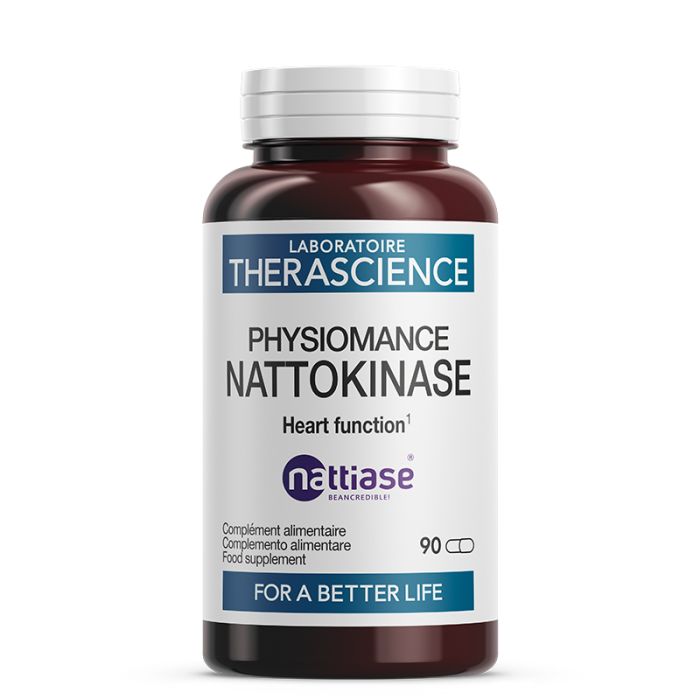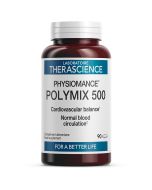PHYSIOMANCE NATTOKINASE provides, for 1 capsule:
- 100 mg of soybean extract fermented with Bacillus subtilis var. natto and titrated to 2,000 FU* in Nattiase® nattokinase, of superior quality, with proven efficacy and guaranteed vitamin K2-free ;
- 100% RI** in vitamin B1, is ideal for primary prevention and support of cardiovascular pathologies.
PHYSIOMANCE NATTOKINASE is ideal for primary prevention and support of cardiovascular pathologies.
* FU : Fibrin degradation enzyme unit
**RI : Reference Intake
Nattokinase and cardiovascular health
Throughout life, the cardiovascular system is put to a severe test. Numerous risk factors (age, overweight, obesity, hypertension, smoking, stress and a sedentary lifestyle) are involved in the development of cardiovascular disease (atherosclerosis, hypertension, coagulation disorders, heart attacks, strokes, etc.). According to the WHO, cardiovascular disease is the world's leading cause of death, accounting for 31% of all deaths.
Renowned for its many benefits for the cardiovascular system (heart and arteries), natto is a fermented soy-based food that has been traditionally consumed in Japan for over 1,000 years. Natto contains an enzyme, nattokinase (link to active page), whose many benefits have been demonstrated by scientific studies.
Nattokinase is a fibrinolytic enzyme, capable of breaking down fibrin. Fibrin is a protein involved in coagulation, and more specifically in the formation of blood clots.
In the normal state, fibrin clots are necessary to stop bleeding in the event of injury. In the case of cardiovascular disease, blood coagulation is altered and accelerated, leading to the inappropriate formation of clots. These clots clog up the arteries and slow down blood circulation, which is essential for tissue oxygenation. Thanks to its fibrinolytic action, nattokinase helps to support optimal blood coagulation as part of cardiovascular prevention.
For optimum effectiveness, our Nattiase® nattokinase, titrated at 2,000 FU*, is combined with 100% of the reference intake of vitamin B1, known to promote good heart function.
* FU : Fibrin degradation enzyme unit
Why choose nattokinase from Laboratoire THERASCIENCE ?
Our Nattiase® nattokinase (link to patented active page) is derived from soybean extract fermented by the Bacillus subtilis var. natto bacterium.
In its natural state, nattokinase is produced by this bacterium during the fermentation and degradation of soy proteins. The production of our nattokinase therefore follows the natto manufacturing process as closely as possible, resulting in the most natural nattokinase possible.
The physico-chemical conditions under which Bacillus subtilis var. natto is grown (pH, temperature, composition of the bacterial culture medium, quantity of soy added, etc.) have been determined beforehand to optimise the production of a nattokinase with maximum efficiency. The fermented soy extract obtained, titrated to 2,000 FU* of nattokinase, is then purified by filtration and centrifugation..
Natto and fermented soy extracts are also rich in vitamin K2. This vitamin can promote coagulation and therefore interfere with the action of nattokinase. To maximise the effectiveness of this enzyme and avoid any interference with vitamin K2, our Nattiase® nattokinase is guaranteed vitamin K2-free thanks to an ultrafiltration process that eliminates its presence.
To ensure optimum quality, Nattiase® undergoes regular quality control tests to guarantee the absence of microbiological contaminants and heavy metals. OurHigh Quality Process® also certifies the origin of the plant extracts selected and present in PHYSIOMANCE Nattokinase.
To enjoy all the benefits of Nattiase® nattokinase, PHYSIOMANCE Nattokinase is guaranteed GMO-free, nanoparticle-free, preservative-free and gluten- and lactose-free thanks to our Clean label THERASCIENCE.
* FU : Fibrin Degradation Enzyme Unit
Bibliography
1. Kurosawa, Yuko et al. Scientific reports (2015)
2. Chen, H., McGowan, E. et al. Biomarker insights (2018)
3. Sumi H, et al. Acta Haematologica (1990)
4. Kim, J. Y., Gum, S. N., et al. Hypertension research. (2008)
5. Chen, H., Chen, J., et al. Frontiers in cardiovascular medicine (2022)
























Recommandé par mon médecin, je l'utilise régulièrement, avec de tvoir plus
Avis du 28/09/2024, suite à une expérience du 11/09/2024 par Silvia S